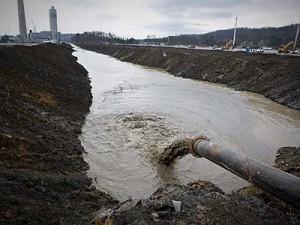It’s whack-a-mole time for anti-environmental legislation in Raleigh, and at this point the moles are winning. This week in CIB:
Legislative Watch: Anti-Environment Measures Metastasize
Judging by the growing number of legislative assaults on North Carolina’s environment, the end of this legislative session can’t come soon enough. (How about last week?)
Bills to retreat from critical environmental protections or add more restrictions on environmentally favorable projects are being amended and moved forward faster than citizen action alerts can cover. The process is driven by the accelerating use of the strip-and-stuff technique in which an unrelated bill that’s passed one chamber is hijacked, renamed, and has its original contents replaced by a set of unrelated (and often lengthy) provisions written without public review. With little or no notice, the bill is presented to committee and swept through to passage by that chamber, overriding any objections raised. The NC Senate leadership in particular has made this anti-transparency technique into their business as usual.
Among the action last week:
HB 593, “Amend Environmental and Other Laws”, passed the Senate. It prohibits requiring various stormwater management measures, slashes critical stream protection limits, and makes various other changes.
SB 770, “NC Farm Act of 2016”, passed the Senate. It includes exemptions for agriculture from capacity use area water withdrawal limits and for horticulture from sedimentation pollution control laws.
HB 483, “Land Use Regulatory Changes”, passed two Senate committees. It changes important local development review procedural rules on evidence, remedies, and appeals to favor developers.
HB 763, “Military Operations Protections Act”, received final Senate approval and was sent to the House. This is the bill that would effectively make most of the state of North Carolina off-limits to wind power development projects—including stopping at least two projects in rural eastern North Carolina with strong local support.
CIB is not alone in regarding the “military operations protection” explanation as a thin ruse for legislation motivated by a desire to discourage the development of renewable energy resources.
Rural economy advocates and environmental advocates agree that this approach is bad business for our state.
The good news on this proposal may be on the House side of the legislature. There, it’s been referred to the House Rules Committee, a move being interpreted as a signal that it may not be considered during the remainder of this year’s session. However, that’s no sure defense while the “strip and stuff” approach to legislation remains at large in the General Assembly.
Coast Watch: Buffers Benefit Clean Water Resources
Legislators considering slapping down state rules protecting riparian buffer zones should take heed. A newly released report confirms that buffers help to protect clean water and aquatic resources.
A report collecting and summarizing extensive scientific findings explains how riparian buffers—strips of undisturbed vegetated land along the edge of rivers and streams—benefits water quality. Key highlights include the following:
These vegetated buffers help to filter out pollutants that would otherwise feed the growth of excess algae that choke polluted waters.
State waters threatened by this excess nutrient pollution will benefit most from the combination of retaining state minimum buffers, allowing local governments to require wider buffers and reducing nutrient pollution from sewage treatment plants as well.
The report was jointly released by the groups Sound Rivers, American Rivers, Southern Environmental Law Center, and NC Conservation Network. It can be read in full here.
Campaign Watch: Democracy Tour Heads to Greenville
NCLCV is among the sponsors of a reprise of the “Why Democracy Matters” public discussion event this week in Greenville. The democracy tour will open its doors tomorrow evening (Tuesday, June 28) at 6:30pm at the Unitarian Universalist Congregation of Greenville, 131 Oakmont Drive, Greenville NC 27858. Nine groups including the NAACP-NC, AFL-CIO-NC, League of Women Voters, and NC Voters for Clean Elections will hold this voter education forum on the issues that will be impacted by this year’s elections.
The forum is free and open to the public. Click here for more information and to register.
Education and Resources: Study Proves Coal Ash Leaks Polluting Water in Five States

A team of Duke University researchers has released a report tracing contamination of waters to coal ash ponds in five southeastern states. The researchers “used geochemical and isotope tracers to demonstrate that all of the [21] investigated sites [in five states including North Carolina] are leaking” to surface water.
The waters were contaminated by high levels of toxic heavy metals including arsenic and selenium at all sites tested. Almost a third of the surface water samples exceeded EPA standards.
At a time when public political debates have often seemed to degenerate into “fact-free zones”, it’s important to remember that evidence still matters. And in this case, the finger of solid science is pointing ever more clearly to coal ash pits as the culprits for dangerous toxic pollution of public waters.
That’s our report for this week.




